Crypto Exchange Safety Checker
Is This Exchange Safe?
Use this tool to check if a crypto exchange meets basic security and regulatory standards. Based on findings from the BITKER scam investigation.
Enter details above to check safety status
Key Red Flags (Based on BITKER Scam)
- No regulatory licenses or registrations
- No KYC/identity verification required
- Claims of "zero fees" or guaranteed profits
- No mobile app or desktop software
- Unrealistic trading volume figures
- Support disappears after deposits
If you're looking up BITKER crypto exchange, you’re probably wondering if it’s safe to use. The short answer: it’s not just unsafe - it’s gone, and it stole money from real people. BITKER was never a real exchange. It was a scam designed to look like one, and it vanished in July 2021 with over $1.2 million in user funds.
What BITKER Actually Was
BITKER claimed to be a cryptocurrency exchange that let you trade Bitcoin, Ethereum, and other coins. It had a clean website, flashy ads, and promises like “zero fees” and “24/7 support.” But none of it was real. The team behind it used fake names, no official company registration, and no licenses from any government financial body - not the SEC, not the FCA, not even a small island regulator.
Blockchain investigators found that BITKER’s entire operation was built on lies. The platform used a hacked version of open-source exchange software with known security holes. These weren’t accidental flaws - they were backdoors. Once you deposited crypto, the funds were instantly moved out of the platform and into wallets controlled by the scammers.
How the Scam Worked
The pattern was classic. New users were lured in with fake trading volume and inflated prices. For example, on July 5, 2021, BITKER showed Bitcoin at $36,200 - while the real market price was $33,800. That gap made it look like you could make quick profits. But the trades weren’t real. Over 90% of the volume was fake - bots trading with each other to make the platform look busy.
Then came the trap. After you deposited, withdrawal requests were delayed. First, they said “technical issues.” Then, “AML checks.” After a few days, support stopped replying. Users who tried to withdraw even $10 found their accounts frozen. Within 24 to 72 hours of depositing, most victims lost everything.
There was no cold storage. No insurance. No multi-signature wallets. Just a digital black hole. Every dollar deposited disappeared into mixer services like Tornado Cash, making recovery impossible.
Why People Got Tricked
BITKER didn’t target experts. It targeted beginners. Over 60% of its users had less than six months of crypto experience. The platform made signing up easy - just an email, no ID, no KYC. That’s not a feature; it’s a red flag. Legitimate exchanges require identity verification for legal and security reasons. BITKER avoided it because they didn’t want to know who you were.
The ads were everywhere. Facebook and Instagram ads targeted people searching for “how to buy Bitcoin.” The ads claimed partnerships with companies that didn’t exist - like “BITKER Financial Ltd.” They spent nearly $300,000 on these ads. That’s not a startup budget. That’s a scam operation with a marketing team.
Victims on Reddit and Trustpilot reported the same story: deposit, wait for withdrawal, get ghosted. One user lost $82,500 in Bitcoin. Another lost $15,000. All of them saw their funds vanish within hours of depositing.
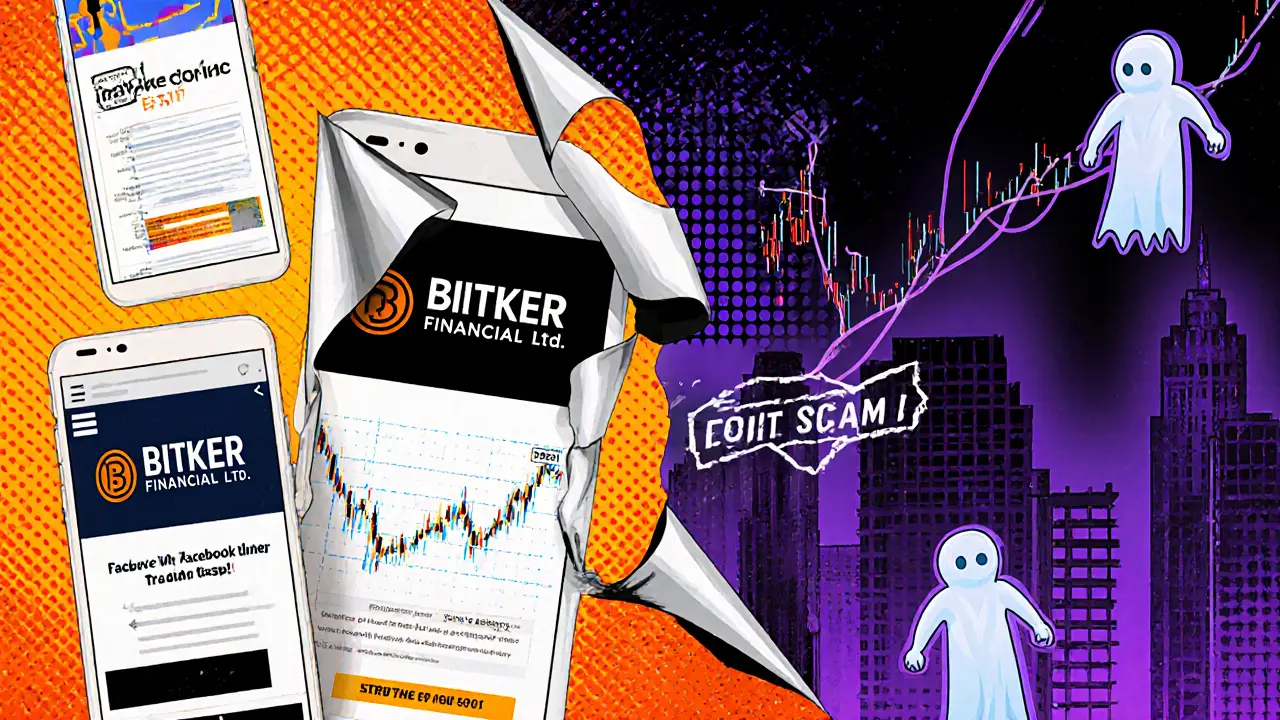
How BITKER Compared to Real Exchanges
Compare BITKER to real exchanges like Bitstamp or Kraken. Bitstamp has been around since 2011. It’s regulated, audited, and insured. Kraken holds $250 million in insurance to cover losses. Their uptime is 99.9%. Their trading volume is billions per day.
BITKER? No licenses. No audits. No insurance. Peak traffic: 3,200 users a day. Server uptime: 68% in its last month. Claimed speed: 200,000 transactions per second. Real speed: barely handled 50. The numbers didn’t just mismatch - they were fantasy.
Real exchanges have APIs for traders, mobile apps, customer service teams that answer emails. BITKER had none of that. Their “support” was a chatbot that stopped working after you deposited. Their documentation was copied from Binance. Their “75 coins” included 41 fake tokens created just to look like they had variety.
The Aftermath
On July 6, 2021, BITKER shut down. All websites went dark. The domains bitker.com and bitker.io now redirect to phishing pages or show blank screens. The servers were turned off. The people behind it disappeared.
Law enforcement tried. The UK’s National Crime Agency closed its investigation in March 2022. INTERPOL confirmed the operators remain unidentified. The stolen funds were laundered through over 200 transactions into privacy coins. Recovery is impossible.
Today, BITKER is a textbook case in crypto scams. It’s listed in reports by Chainalysis, CipherTrace, and the FATF as an example of a “high-confidence exit scam.” It’s taught in courses on crypto security.
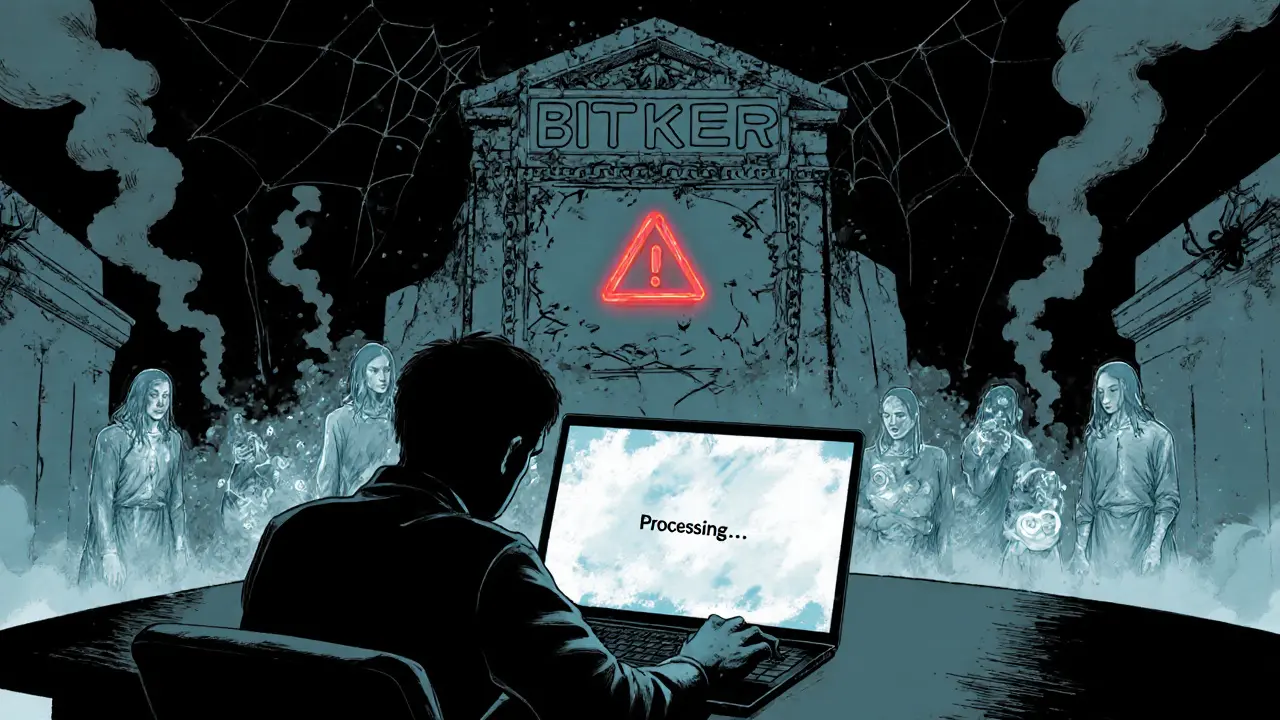
What You Should Do Now
If you used BITKER and lost money - you’re not alone. But don’t waste time chasing recovery. There is none. Don’t respond to anyone claiming they can “get your funds back” for a fee. That’s a second scam.
If you’re new to crypto and thinking about trying a new exchange, here’s what to check:
- Is it licensed? Look for regulation by the SEC, FCA, ASIC, or similar.
- Does it have real customer support? Try emailing them with a simple question. Do they reply within 24 hours?
- Is there a mobile app? Legit exchanges invest in apps. Scams don’t.
- Can you find independent reviews? Search for “exchange name + scam” on Reddit or Trustpilot. If every review is negative or gone, walk away.
- Is trading volume real? Check CoinGecko or CoinMarketCap. If the exchange isn’t listed or has zero volume, it’s fake.
Never deposit more than you can afford to lose. And if something looks too good to be true - like “zero fees” or “guaranteed profits” - it is.
Why This Matters
BITKER isn’t just a bad exchange. It’s a warning. The crypto space is full of people who want your money, not your success. Scams like this hurt trust in the whole industry. But they also teach us how to protect ourselves.
The good news? Since 2021, exit scams like BITKER have dropped by over 60%. Why? Because people are learning. Exchanges are being held to higher standards. Regulators are watching.
But you still have to be the first line of defense. Don’t trust a website. Don’t trust an ad. Don’t trust a Telegram group pushing a “new opportunity.” Check the facts. Look for proof. And if you can’t find it - don’t risk it.
Is BITKER still operating?
No. BITKER shut down permanently on July 6, 2021. All websites and services were taken offline. The domain names now redirect to phishing pages or show empty sites. There is no active platform, no customer support, and no chance of recovery.
Can I get my money back from BITKER?
No. All stolen funds were laundered through privacy tools like Tornado Cash and mixed across hundreds of transactions. Investigations by the UK’s National Crime Agency and INTERPOL confirmed the money is unrecoverable. Anyone claiming they can recover your funds for a fee is running a second scam.
Was BITKER regulated?
No. BITKER had no license from any financial authority - not the SEC, FCA, MAS, or any other regulator. It operated as an unregistered offshore shell company. Japan’s FSA even issued a public warning about it in June 2021.
Did BITKER have a mobile app or API?
No. Despite advertising claims, BITKER had no mobile app, no API access, and no desktop software. It was only accessible through a web browser. This was intentional - it made it harder for users to track their funds or automate security checks.
How many people lost money to BITKER?
Over 100 verified victims reported losses totaling $1.2 million, according to Chainalysis. Reddit’s r/CryptoScams has 147 posts from victims between June and July 2021. Telegram groups like ‘BITKER Victims’ have over 1,200 members. All reported total loss of funds. No one recovered anything.
How do I avoid scams like BITKER in the future?
Stick to exchanges that are regulated, have public company details, and are listed on CoinGecko or CoinMarketCap. Check for real customer support, a mobile app, and independent reviews. Never deposit without doing your own research. If a platform promises high returns with no risk, it’s a scam. Always assume the worst until proven otherwise.

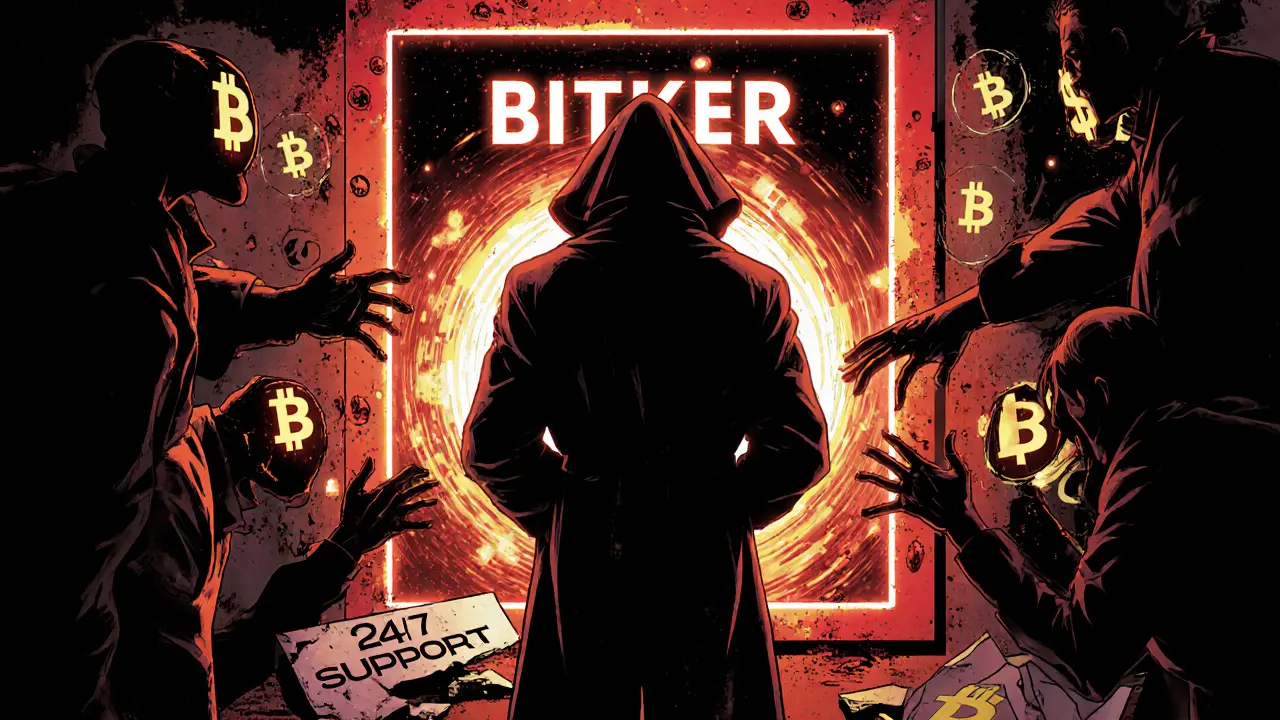
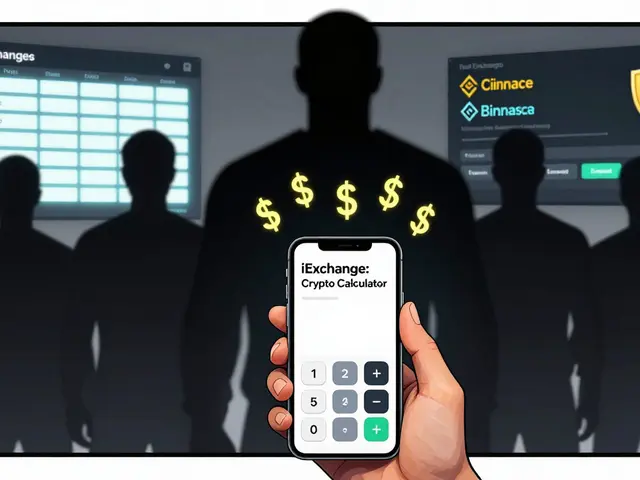

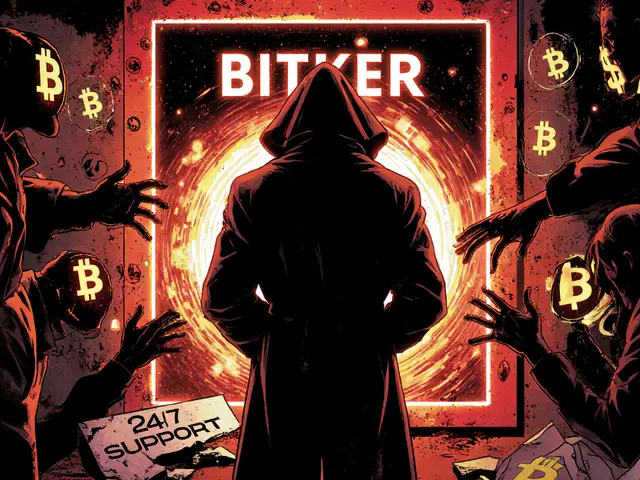
Kaitlyn Boone
November 19 2025bitker was such a classic case of fake volume and fake support - i lost $4k and still get chills thinking about it. no one cared until it was too late.
Natalie Reichstein
November 20 2025People still fall for this stuff? Honestly, if you didn’t check if an exchange was regulated before depositing, you deserve to lose everything. No sympathy. This isn’t rocket science - it’s basic due diligence. The fact that you trusted a site with zero licensing and no KYC? That’s not naivety, that’s negligence.
James Edwin
November 21 2025I remember when this blew up on Reddit - I was just getting into crypto and almost signed up. I’m so glad I took a step back and googled ‘BITKER scam’ before depositing. Seriously, if you’re new, don’t trust flashy ads. Look at the people behind it. If their names are fake, walk away. It’s that simple.
Kris Young
November 22 2025BITKER had no licenses, no audits, no insurance, no mobile app, no API, no real support - and yet people still sent money? It’s almost unbelievable. Every single red flag was flashing. If you missed them, you weren’t paying attention. I’m not blaming victims - I’m just saying, the signs were everywhere.
LaTanya Orr
November 23 2025It’s strange how we blame the victims when the system is designed to exploit them. Ads don’t lie on their own - they’re paid for by people who know exactly what they’re doing. The real question isn’t why people got scammed - it’s why the platforms that allowed those ads are still allowed to exist.
Ashley Finlert
November 24 2025The tragedy of BITKER is not merely financial - it is existential. It represents the erosion of trust in a nascent technological frontier, where illusion is meticulously crafted to mimic legitimacy. The scammers did not merely steal funds; they stole the innocence of a generation learning to navigate digital finance. The silence of regulators, the complicity of ad networks - these are the true architects of this collapse.
Chris Popovec
November 26 2025Let’s be real - this was a state-sponsored op. The fact that INTERPOL couldn’t trace it? That’s not incompetence. That’s intentional. The same people behind BITKER are running other scams. They’re using blockchain analysis tools to mask their tracks. The government knows who they are. They just don’t care. Crypto is a sandbox for the elite to launder money and test surveillance tech. BITKER was just the tip.
Marilyn Manriquez
November 26 2025Thank you for sharing this detailed account. It is imperative that we continue to educate newcomers about the importance of verification and due diligence. The cryptocurrency space holds great promise, but it demands responsibility from all participants. Let us honor those who lost funds by ensuring others do not suffer the same fate.
taliyah trice
November 28 2025i lost $2k to bitker. still mad. dont trust anyone who says they can get your money back. they just want more.
Charan Kumar
November 28 2025India also had many people tricked by such sites. People think crypto is easy money. But no one teaches them how to check if a site is real. Even my cousin lost money. He thought because it had a logo and a phone number it was legit. Now he avoids crypto altogether
Peter Mendola
November 29 2025BITKER was a textbook exit scam. 100% confirmation. No recovery. No hope. Don’t waste time. Don’t engage with ‘recovery firms.’ They’re the next layer of the scam. Period.
Terry Watson
November 30 2025I still get emotional thinking about this. I watched my friend deposit $15,000 - he was so excited. He had saved for a year. Then, poof - gone. No emails returned. No updates. Just silence. I cried for him. And now? He’s too scared to even look at crypto again. That’s the real cost.
Sunita Garasiya
November 30 2025Oh so BITKER was a scam? Shocking. Next you’ll tell me the moon landing was faked or that my WiFi router is spying on me. Honestly, if you can’t tell a scam from a real site, maybe you shouldn’t be touching crypto at all. Or maybe you just like losing money and telling stories about it
Mike Stadelmayer
November 30 2025Man, I’m just glad I took my time. I saw BITKER pop up in my feed and thought ‘huh, looks clean.’ But I waited a week. Checked Reddit. Found this exact thread. Walked away. Best decision I ever made. Crypto’s wild - but you don’t have to jump into every fire.
Norm Waldon
December 2 2025Of course this happened. The U.S. government lets these scams run because they want crypto to fail. They’re scared of decentralized finance. BITKER? Probably funded by the Fed to discredit Bitcoin. The real scam isn’t the exchange - it’s the entire system that lets this happen. And don’t even get me started on Tornado Cash being targeted while the banks launder billions.